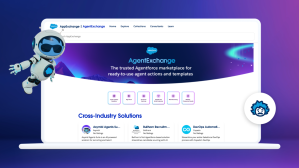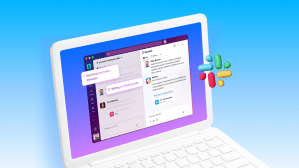Key Takeaways
- Launched in March, AgentExchange is an AI agent marketplace with hundreds of prebuilt partner actions, topics, and templates that work with Salesforce’s digital labor platform, Agentforce.
- AgentExchange is helping bolster the “agent economy,” with companies across the Salesforce ecosystem supplying digital labor for a range of essential business tasks.
Twenty years ago, the Salesforce AppExchange launched a thriving cloud app ecosystem that enabled businesses to enhance and customize their Salesforce environments — before cloud computing had been proven as a business model. Since that time, companies have installed more than 13 million apps from Salesforce’s more than 7,000 technology partners.
Today, as organizations increasingly deploy AI agents to perform a wide range of essential business tasks with minimal human oversight, the agent economy may surpass the scale of the app economy.
PwC predicts the size of the agentic AI economy will reach nearly $16 trillion by the year 2030, making it 10 times larger than today’s SaaS economy. Nearly half of that gain will come from agents that enhance existing products, offering users a greater range of choices and more finely tuned personalization, through industry-specific integrations and templates.
“We all want more time back in our day, but we all also want the ability to scale our businesses as fast as possible,” said Brian Landsman, Executive Vice President of Business Development and Partnerships for Salesforce. “Using agents is like taking one person’s output and multiplying it by five. Agents can perform tedious tasks in the background, saving you hours of work and allowing you to focus on the things that really matter for your business.”
The introduction of AgentExchange, Salesforce’s marketplace for AI agents designed to work with the company’s Agentforce digital labor platform, will bring unprecedented gains in productivity and growth across the Salesforce ecosystem, said Landsman.
AgentExchange extends that vision into the age of agentic AI, empowering customers to automate key processes, integrate systems, and tap into third-party actions and skills.
Brian Landsman, Executive Vice President of Business Development and Partnerships for Salesforce
“Salesforce’s AppExchange has fostered a powerful ecosystem for nearly 20 years, with more than 91% of our customers utilizing partner apps to enhance their Salesforce experience,” he said. “AgentExchange extends that vision into the age of agentic AI, empowering customers to automate key processes, integrate systems, and tap into third-party actions and skills.”
The arrival of the agent marketplace
AgentExchange launched in March 2025 with hundreds of agents from more than 200 Salesforce partners. The range of essential business tasks automated by these agents runs the gamut, from document management and payment systems through prospect targeting and AI-powered recruiting solutions. Developers can discover and try hundreds of prebuilt partner actions, topics, and templates on the marketplace or surfaced directly within Salesforce’s agent building tools.
One of the first companies to build agents for AgentExchange was Copado, a longtime Salesforce partner. Its DevOps Automation Agent automates time-consuming tasks such as deployment, testing, and compliance checks. That gives developers the time to do things they actually want to do, said Gloria Ramchandani, Copado’s senior vice president of product.
“Code reviews and compliance checks are typically manual tasks that consume a lot of time,” she said. “The Copado agent allows devs to spend less time fixing bugs and more time building new applications and features.”
Ramchandani said Copado started ten years ago with the goal of making ‘release days’ obsolete, enabling developers to ship new code multiple times per week, instead of a few times per year. Intelligent agents bring them much closer to achieving that goal.
“AI agents are revolutionizing DevOps,” she said. “By leveraging AI agents, developers can spend less time firefighting and more time innovating.”
Meet the agentic corporation
In the near future, entire companies will be built around providing digital labor to augment human workforces, according to Landsman.
“We expect there will be a whole new category of native Agentforce independent software vendors, just as we had early cloud native ISVs during the first iteration of the AppExchange,” said Landsman.
Customers will also be able to grow their own practice areas by creating custom tasks within Agentforce. For example, the Adecco Group, one of the world’s largest talent and staffing agencies, recently announced the launch of a new company, called r.Potential, to help organizations build an integrated workforce of humans and AI agents. Powered by Agentforce, the new firm will enable enterprises to assemble teams where human and digital labor work side by side.
“Today’s labor economy is worth around $30 trillion dollars,” noted Greg Shewmaker, CEO of r.Potential. “Some portion of that will continue to be human labor, and some will shift to digital. Companies will need to plan for this future of work, which is one of the reasons why we created r.Potential.”
By combining Adecco’s vast amounts of workforce data with Agentforce, r.Potential will help organizations identify “units of potential” – tasks that can be automated or augmented by digital labor.
For example, employees will be able to engage r.Potential agents via Slack, describe their business and the kinds of work they’re hoping to perform, and receive recommendations for the right configuration of human and digital workers to achieve their business goals, Shewmaker said.
“Adecco has data on 10 million companies,” he added. “We understand your company’s labor needs. Now we can bring in Agentforce and say, ‘Here’s what these agents are capable of doing, and here are the roles we think you can automate’.”
At the same time, r.Potential agents can also help managers assess the skills present in their human workforce, as well as each individual’s potential for future development, which can aid in future workforce planning.
“I think it’ll be absolutely critical for every business to evolve their models around human and digital labor,” said Shewmaker. “Some organizations will look at agents as tools their employees use to be more productive. Others will be looking to augment or amplify their entire workforce with digital workers. Either way, agents are going to have a major impact on the economy.”
No industry will be left untouched
In a few years, said Shewmaker, people will interact with digital workers in much the same ways they do today with their human coworkers.
“We’ll be speaking to them with our voices and engaging with them on Slack, email, and text,” he added. “They’ll start to feel very much like colleagues.”
And as agents get better over time — becoming smarter, more performant, and more accurate — they’ll take on tasks that humans no longer need to perform, such as qualifying sales leads, handling support calls, or performing research on a prospect, said Landsman.
I don’t think the world fully understands how wide of a surface area AI agents will cover – everything from shopping and financial advice to healthcare and academic research.
Brian Landsman, Executive Vice President of Business Development and Partnerships for Salesforce
“I don’t think the world fully understands how wide of a surface area AI agents will cover – everything from shopping and financial advice to healthcare and academic research,” said Landsman. “And that’s just business-to-consumer use cases. B2B examples are even larger. The agent economy is going to be enormous.”
More information:
- Read the AgentExchange announcement and check out AgentExchange
- Dive deeper into the $6T digital labor opportunity afforded by agentic AI




















